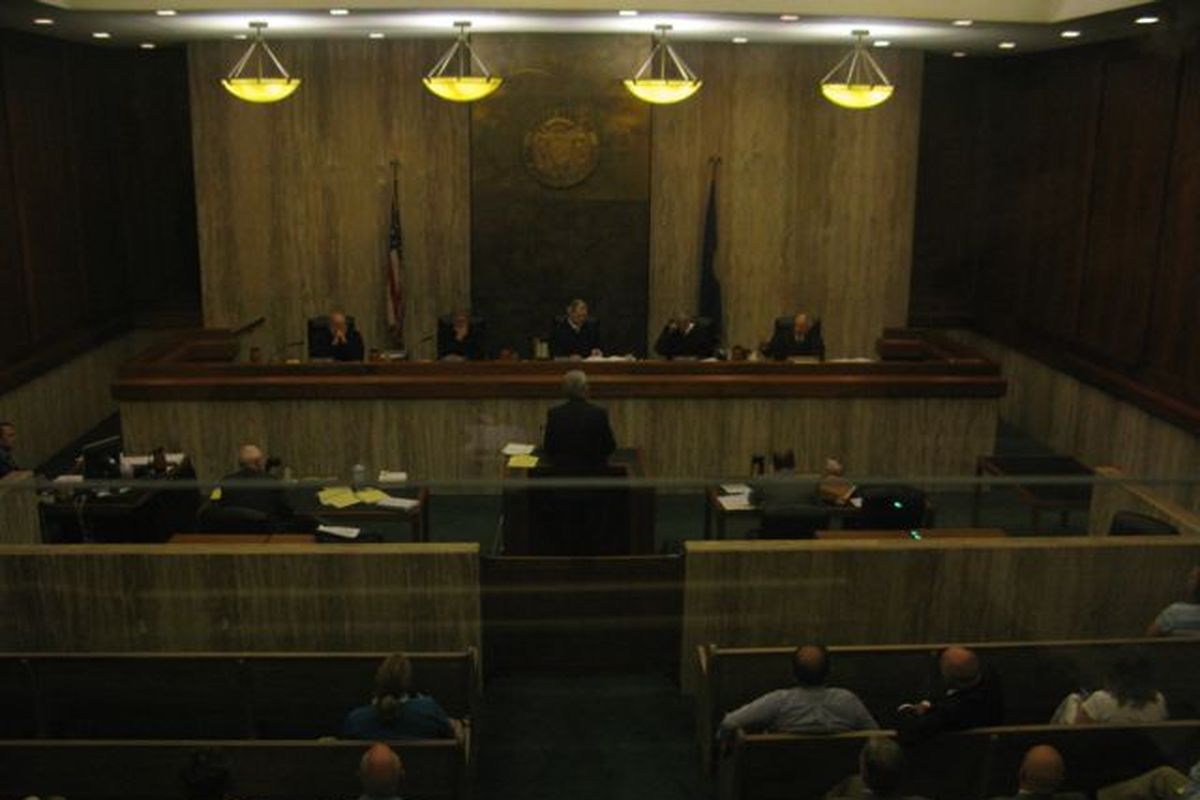Idaho’s high court says judge must move
The Idaho Supreme Court hears an appeal from District Judge John Bradbury, of Lewiston, of the Idaho Judicial Council's attempt to suspend him from office because they charged he doesn't live in his district, though he has a home there. (Betsy Russell / The Spokesman-Review)
BOISE — The Idaho Supreme Court said Thursday 2nd District Judge John Bradbury was violating the residency requirement for his seat on the bench and must make his primary home in Idaho County within three weeks.
Justice Jim Jones scolded Bradbury for trying to justify having his primary residency in Nez Perce County by saying that living full-time in Idaho County would prohibit him from carrying out his constitutional duties.
“Nothing in our constitutional system allows an individual district judge to determine, on his own, what his duties are and how they will be performed,” Jones wrote for the majority. “No judge is above the law.”
Bradbury said he was disappointed because the judges didn’t detail how much time he must spend in Idaho County, and only said his current living arrangements didn’t meet the residency requirements.
“My issue is that actual residence still isn’t better defined, so I still don’t know what’s required of me,” Bradbury said.
The high court stopped short of suspending Bradbury or finding that he violated the code of judicial conduct, as the Idaho Judicial Council had requested.
But the justices said they would revisit the issue if Bradbury didn’t make his primary home in Idaho County and submit an affidavit stating he would reside there as long as the law requires him to do so.
Bradbury has two homes. One is the Idaho County city of Grangeville, where his official judicial chambers are located. The other is in nearby Lewiston in Nez Perce County.
Bradbury has argued that because his job requires him to travel to several courthouses in the region, Lewiston affords him a shorter commute, saving time and money and allowing him to get more court work done.
He has said the location also provides for safer travel in the winter, when wind blowing across the Idaho County prairie can turn a snowstorm into a whiteout.
The road from Lewiston to the Clearwater County courthouse in Orofino, where Bradbury hears cases and holds drug and mental health courts, is easier to travel because it runs along the river and rarely gets snow, he said.
Bradbury fears he’ll have to end the alternative courts in Orofino for lack of travel time, especially in winter.
“I fought for three years to get a mental health court there, and it’s the only rural mental health court in the state,” Bradbury said. “It’s frustrating for rural counties — they’re the orphans of the system. They’re the last ones to get services.”
He said he always stayed in his Grangeville home when he had a trial in that city, and that he was registered to vote and had a homeowner’s tax exemption there.
In 2008, the judicial council determined Bradbury was in violation of the residency rules and recommended the Idaho Supreme Court suspend him from the bench until he came into compliance.
Retired Justice Wayne Kidwell, who took Justice Joel Horton’s place on the court for the case, dissented with Thursday’s ruling. He said there wasn’t enough information to determine just how much time someone has to spend in a place in order to reside there. Without that, he said, he couldn’t conclude that Bradbury was violating the rules.
“It appears that Judge Bradbury is dutifully carrying out the responsibilities to which he has been constitutionally elected,” Kidwell wrote.
The case has political undertones. Last year Bradbury nearly won a seat on the Idaho Supreme Court himself. He lost with 49.9 percent of the vote to Horton’s 50.1 percent. Horton has recused himself from the residency case.
Bradbury has also filed a federal lawsuit against the Idaho Supreme Court, contending he was being denied his right to due process because Chief Justice Daniel Eismann is also chairman of the Idaho Judicial Council.
Eismann presided over the oral arguments in the case in July but recused himself in August.
Keith Roark, the attorney for the Idaho Judicial Council, said he was pleased with the ruling.
“I think that it’s a very, very well written opinion by Justice Jones — I think it’s clear and concise and by no means overly harsh,” he said.

